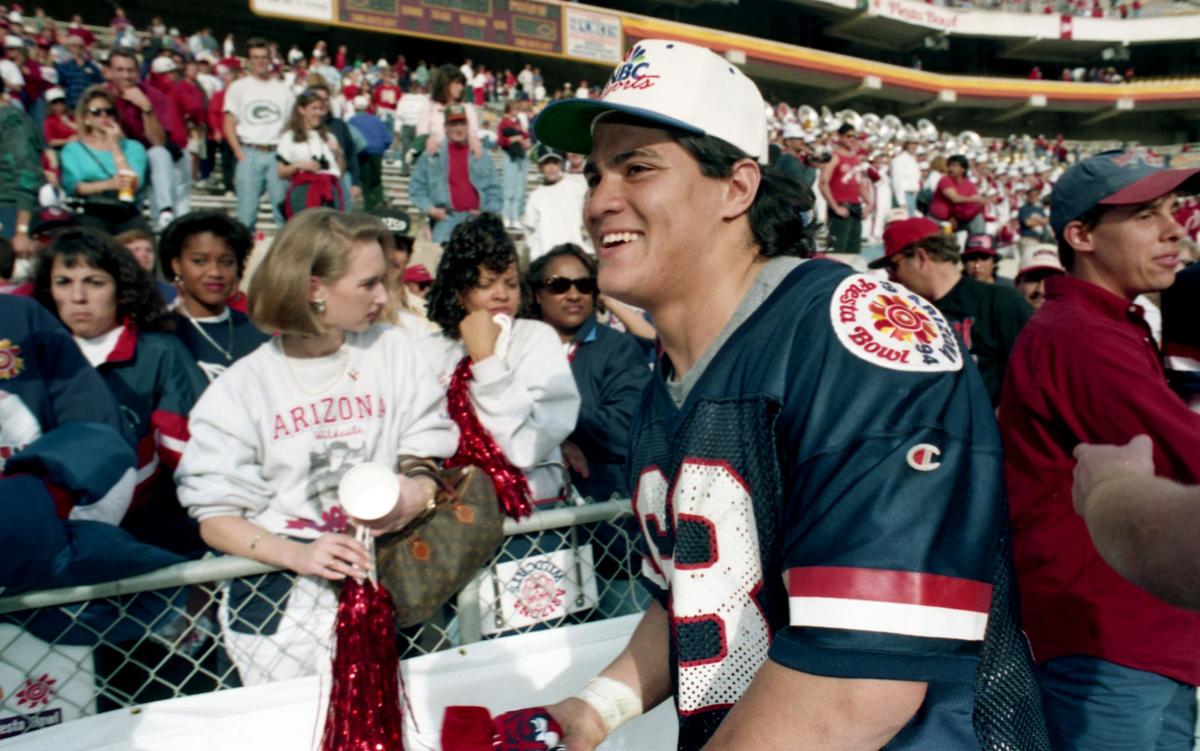In August of 2002, I stood in the New England Patriots locker room at Gillette Stadium waiting for Tedy Bruschi. The clock struck midnight. Then 12:30. About 10 reporters lingered near Bruschi’s cubicle.
He had injured his knee in a preseason game against Carolina and was consulting with the Patriots’ medical staff. I looked at the media credentials of those on the Bruschi watch and was impressed.
Boston Globe. ESPN. Boston Herald. Quincy Patriot-Ledger. WEEI radio. Cape Cod Times. That so many reporters lingered beyond deadline to get a word from Bruschi testified to the value of a man who six months earlier helped the Patriots win Super Bowl XXXVI.
When Bruschi hobbled back to his locker, he reached to a shelf above his street clothes, clutched an Arizona cap and put it on. He looked at me and said “Bear Down.”
That little act of kindness was forever fixed in my brain. Wouldn’t it be a coup if Arizona could someday get Tedy Bruschi — surely the most famous human being in its football history — back in the Wildcat program?
It is not a novel concept. Four years ago, Arizona State hired the most accomplished quarterback in school history, Phoenix native Danny White, a Super Bowl champion. White has since been the Sun Devils’ Football Consultant and Sun Devil Club Ambassador.
It didn’t take genius, it just took common sense.
Two of the greatest football players in Washington history, quarterbacks Sonny Sixkiller and Damon Huard, are key parts of the UW athletic department. Colorado hired the star quarterback of its 1990 national championship team, Darian Hagan, to be its running backs coach.
It helped the Buffaloes preserve a link to the shining moment in school history.
Yet through two troubled coaching regimes, Arizona distanced itself from school history and ex-Wildcats.
I didn’t see Bruschi again until he spoke at the Southern Arizona Chapter of the College Football Hall of Fame banquet in the spring of 2010. At 37, he had been out of football for a year. He was asked if he ever considered going into coaching, specifically at Arizona, his alma mater.
“At this time, no,” he said. “I just started working for ESPN and I’m going to see how that works out.” It worked out fine. For 11 years, every weekend during the NFL season, Bruschi has traveled by train to an ESPN studio in New York City to talk football.
The most recognizable name and face in UA football history, Bruschi had created a home in Massachusetts the way he created a home in Tucson.
It didn’t mean UA football fans who felt disconnected during the Kevin Sumlin and Rich Rodriguez years had forgotten Bruschi and the success of his Desert Swarm teams. But those in positions of power didn’t make a move to fix it.
After Kevin Sumlin was fired in December, I phoned Bruschi and asked if he was interested in coaching his alma mater.
“I never considered it like this before,” he said. “I’ve made a marathon of phone calls to people in the last day or two to see how it adds up. I’ve been playing phone tag with (UA athletic director) Dave Heeke.”
After two days of research, Bruschi chose to remain in Boston. His wife, Heidi, a former Sahuaro High School and UA volleyball player, coached the Feehan High School Shamrocks to a perfect season in the fall. Their son, Dante, plays football at Feehan, where Bruschi serves as an assistant coach.
Rex, the middle of three sons to Tedy and Heidi, has committed to play varsity lacrosse at nearby Endicott College.
The football-savvy Bruschi might’ve been the right man for the job, but the timing wasn’t anywhere near right.
“I love my Wildcats but I will not pursue the coaching position, even if it is offered,” he told me. “I have been considering it very seriously, but it is time for me to watch my family play and coach. I have to trust Dave Heeke to make the right decision”
Two days later Arizona hired Jedd Fisch, an itinerant coaching stranger. As the chorus of objections blazed — but before Fisch moved to Tucson he phoned Bruschi. The two men talked about Arizona football and what once made it work.
What happened over the next five weeks was like a guy from the cable company fixing your TV connection, giving you high-speed internet and all the extras, and telling you how to get the movie channels for free.
“You’ve been offline for too long,” he’d say.
That’s Jedd Fisch, cable guy.
Fisch hired UA college football Hall of Famers Ricky Hunley and Chuck Cecil as full-time assistant coaches. He hired Rincon High alumnus Beyah Rasool as a defensive analyst. He added 1990s All-Pac-10 safety Brandon Sanders as the program’s coordinator of Football Alumni and High School relations.
And on Monday, Fisch hired Bruschi as a senior advisor, a consultant to the entire staff who will also help with fundraising, alumni relations and student-athlete development.
Six weeks ago Arizona really didn’t have a relationship with the community, with football alumni or high school coaches and players. Now, as Bruschi said in a statement, “I have established my connection.”
Don’t expect Bruschi and his family to move to Tucson. In a world of remarkable communications technology, Bruschi is likely to do most of his work remotely, from Massachusetts, and fly to Tucson several times a year, doing what he does best — communicate to a football program and community that for too long forgot how valuable communication can be.
In Massachusetts, Bruschi established “Tedy’s Team,” an organization that has raised more than $5 million for the American Stroke Association, a community outreach effort known as the “Comeback Assistance Program.”
No one needs a comeback more than Arizona’s football program. Getting Bruschi on board is another strong move to see that comeback through.





